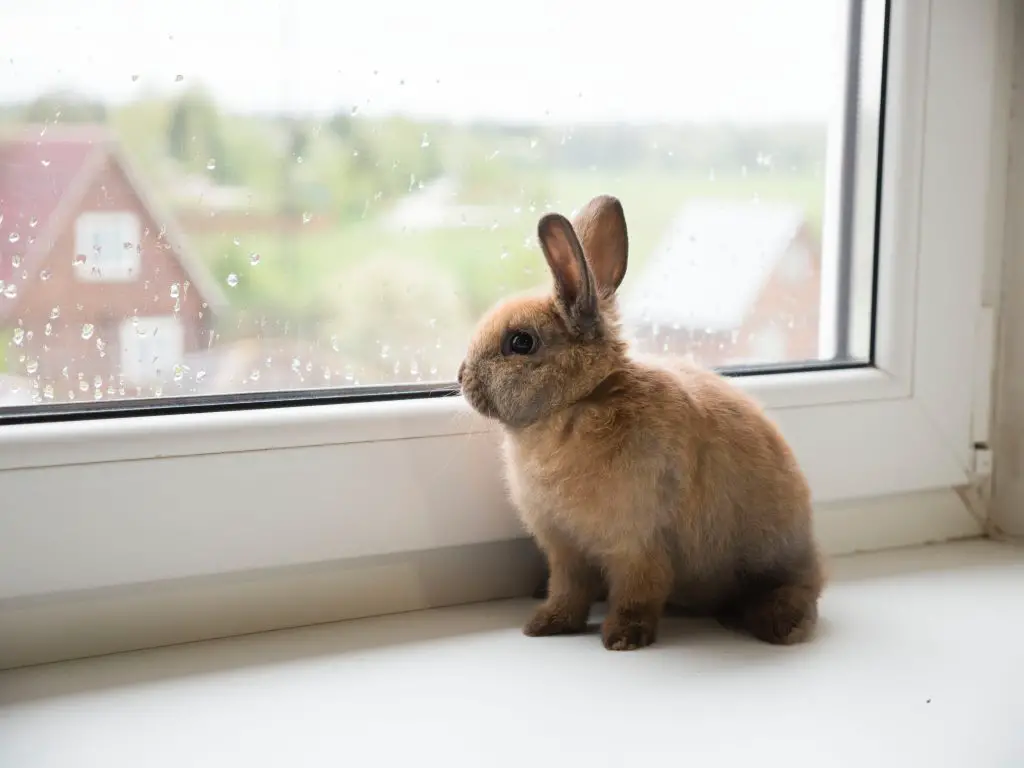Average Lifespan, Factors Affecting Longevity, and Care Tips
Rabbits are adorable, fluffy creatures that make great pets. But how long do they actually live? The lifespan of a rabbit can vary depending on several factors, including breed, diet, and living conditions. In this article, we will explore the lifespan of rabbits, the different breeds, and how to care for them to ensure they live a long and healthy life.
Domestic rabbits can live for up to 12 years, while wild rabbits have a much shorter lifespan due to the constant threat of predators and disease. However, certain breeds of domestic rabbits are known to live longer than others. It’s important to understand the lifespan of your rabbit so you can provide the necessary care and attention they need to live a happy and healthy life.
Caring for a rabbit involves providing them with a balanced diet, a safe and comfortable living environment, and regular visits to the vet. In addition to these basic needs, rabbits also require socialization and mental stimulation to prevent boredom and depression. By understanding the needs of your rabbit and providing them with the proper care, you can help ensure they live a long and happy life.
Key Takeaways
- The lifespan of domestic rabbits can range from 8-12 years.
- Certain breeds of rabbits are known to live longer than others.
- Providing proper care, including a balanced diet, safe living environment, and socialization, can help ensure your rabbit lives a long and healthy life.
Lifespan of Rabbits
Rabbits are popular pets that are loved for their cute and cuddly appearance. They are also known for their long lifespan, which depends on various factors. In this section, we will discuss the average lifespan of rabbits and the factors that affect their lifespan.
Average Lifespan of Rabbits
According to PetMD, domestic rabbits usually live between 8-12 years, while wild rabbits may only live a few years due to disease, starvation, and predators. However, the lifespan of rabbits can vary depending on their breed, genes, and quality of care they receive.
Different breeds of rabbits have different lifespans. For example, dwarf or miniature breeds tend to live longer than giant breeds, as reported by The Spruce Pets. Other factors that affect the lifespan of rabbits include diet, exercise, environment, and genetics.
Factors Affecting Lifespan
Diet
A balanced diet is essential for the health and longevity of rabbits. They require a diet that is high in fiber, low in fat, and rich in nutrients. Feeding your rabbit a diet that is too high in carbohydrates or too low in fiber can lead to digestive problems, dental issues, and other health problems that can affect their lifespan.
Exercise
Rabbits are active animals that require exercise to maintain their health and wellbeing. Lack of exercise can lead to obesity, muscle weakness, and other health problems that can shorten their lifespan. Providing your rabbit with enough space to run and play, and toys to keep them active, can help them live longer.
Environment
The environment in which your rabbit lives can also affect their lifespan. Rabbits need a clean, safe, and comfortable living space that is free from hazards such as sharp objects, toxic substances, and extreme temperatures. Providing your rabbit with a suitable environment can help prevent accidents and illnesses that can shorten their lifespan.
Genetics
Genetics also play a role in the lifespan of rabbits. Some breeds may be more prone to certain health problems than others, while some rabbits may inherit genetic conditions that can affect their lifespan. Regular check-ups with a veterinarian can help detect and treat any health problems early, which can help your rabbit live longer.
In conclusion, the lifespan of rabbits depends on various factors, including breed, diet, exercise, environment, and genetics. Providing your rabbit with proper care, nutrition, and a safe environment can help them live a long and healthy life.
Rabbit Breeds
Rabbits come in many different breeds, each with its own unique characteristics and lifespan. Here are some of the most popular rabbit breeds, along with their average lifespan.
Popular Rabbit Breeds
-
New Zealand White: This is one of the most popular breeds of rabbit, known for its large size and docile temperament. New Zealand Whites can live up to 12 years.
-
Dutch: The Dutch breed is known for its distinctive black and white markings. They can live up to 10 years.
-
Lionhead: This breed is known for its long, fluffy mane of hair around its head. Lionheads can live up to 8 years.
Dwarf Rabbit Breeds
Dwarf rabbits are smaller in size and have a longer lifespan than larger breeds. Here are some of the most popular dwarf rabbit breeds:
-
Netherland Dwarf: This is one of the smallest breeds of rabbit, weighing only 2-2.5 pounds. They can live up to 12 years.
-
Holland Lop: Holland Lops are a popular breed of dwarf rabbit, known for their floppy ears. They can live up to 10 years.
-
Mini Rex: Mini Rex rabbits are known for their soft, velvety fur. They can live up to 9 years.
Giant Rabbit Breeds
Giant rabbits are larger in size and have a shorter lifespan than smaller breeds. Here are some of the most popular giant rabbit breeds:
-
Flemish Giant: This is the largest breed of rabbit, weighing up to 20 pounds. They have a shorter lifespan than smaller breeds, living up to 6-8 years.
-
Checkered Giant: Checkered Giants are known for their distinctive black and white markings. They can weigh up to 12 pounds and live up to 7 years.
-
Giant Chinchilla: This breed is known for its soft, dense fur. They can weigh up to 12 pounds and live up to 8 years.
Domestic rabbits, whether they are dwarf, giant, or somewhere in between, can live up to 8-12 years with proper care. It’s important to research the specific needs of your rabbit’s breed to ensure they live a long and healthy life.
Rabbit Care
When it comes to rabbit care, there are several important factors to consider to ensure your furry friend lives a long and healthy life. These factors include nutrition, exercise, health, and environment.
Nutrition
A healthy diet is essential for rabbits. They require a diet that is high in fiber, so it’s important to provide them with unlimited access to hay, such as timothy hay. Pellets should also be included in their diet, but make sure to choose high-quality pellets that are specifically formulated for rabbits. Additionally, rabbits should be given fresh vegetables and fruit daily, but make sure to introduce new foods gradually to avoid digestive issues.
Exercise
Rabbits are active animals and require regular exercise to maintain their physical and mental health. Providing your rabbit with a suitable environment to move around and play is essential. Make sure to provide them with toys and mental stimulation to keep them entertained. Additionally, rabbits love to chew, so make sure to provide them with safe and appropriate items to chew on.
Health
Regular check-ups with a veterinarian are important to ensure your rabbit is healthy. Watch for signs of illness, such as changes in appetite, behavior, or bathroom habits. Additionally, providing your rabbit with a healthy diet and environment can help prevent health issues, such as dental problems and obesity.
Environment
Rabbits require a suitable environment to live in. They need enough space to move around and exercise, so make sure to provide them with a large enough enclosure. Additionally, rabbits are social animals and require companionship, so consider getting them a friend if you only have one rabbit. Make sure to provide them with a clean and safe environment, and access to fresh water at all times.
In conclusion, proper rabbit care is essential for a long and healthy life. Providing them with a healthy diet, regular exercise, and a suitable environment can help prevent health issues and ensure they live a happy life.
Reproduction and Health
Sexual Maturity
Male rabbits, also known as bucks, reach sexual maturity at around 4-5 months of age, while female rabbits, also known as does, reach sexual maturity at around 4-6 months of age. It is important to note that rabbits can reproduce quickly, and a single pair of rabbits can produce up to 18 offspring in a single year. Therefore, if you do not plan to breed your rabbits, it is important to have them spayed or neutered.
Spaying and Neutering
Spaying and neutering are important procedures that can help prevent unwanted litters and improve the overall health of your rabbit. Spaying involves the removal of the uterus and ovaries in female rabbits, while neutering involves the removal of the testes in male rabbits. These procedures can also help prevent certain health issues, such as uterine cancer in female rabbits and testicular cancer in male rabbits.
Illnesses and Diseases
Rabbits can be susceptible to a variety of illnesses and diseases, some of which can be contagious to other rabbits. Some common illnesses and diseases in rabbits include overgrown teeth, snuffles, ear infections, and myxomatosis. It is important to monitor your rabbit’s health and behavior and seek veterinary care if you notice any signs of illness or discomfort.
In addition to preventative measures such as spaying and neutering, it is important to provide your rabbit with a healthy diet, clean living environment, and regular exercise to help maintain their overall health and well-being.
Predators and Prey
Rabbits have many natural predators in the wild, including foxes, eagles, and other birds of prey. Wild rabbits use a variety of strategies to protect themselves from these predators, including hiding in burrows, blending in with their surroundings, and running away quickly.
Natural Predators
Foxes are one of the most common predators of wild rabbits. They are skilled hunters and can easily catch a rabbit if it is not careful. Eagles and other birds of prey are also a threat to rabbits, especially smaller rabbits. Larger rabbit breeds may have a better chance of defending themselves against predators, but they are still vulnerable to attack.
Protecting Pet Rabbits
If you have a pet rabbit, it is important to protect them from predators. One way to do this is to make sure their living space is rabbit-proof. This means that there are no holes or gaps in the enclosure that predators can use to gain access. You can also provide your rabbit with hiding places, such as boxes or tunnels, to help them feel safe and secure.
Another way to protect your pet rabbit is to supervise them while they are outside. This will allow you to intervene if a predator is nearby. You can also use a leash or harness to keep your rabbit close to you.
In addition to protecting your rabbit from predators, it is important to provide them with a healthy diet and regular veterinary care. This will help ensure that your rabbit lives a long and happy life.
Fun Facts
Oldest Rabbit on Record
According to Guinness World Records, the oldest rabbit on record was a domestic rabbit named Flopsy. She lived to be 18 years and 10.75 months old, which is quite an impressive feat for a rabbit. Flopsy was a dwarf rabbit who lived in Australia and was owned by a woman named Lorraine Salter.
While Flopsy may be the oldest rabbit on record, it’s important to note that the lifespan of a rabbit can vary greatly depending on factors such as breed, diet, and exercise. On average, pet rabbits live for about 5-10 years, but some breeds can live longer than others.
Famous Rabbits
Rabbits have been a popular subject in literature, film, and television for many years. Here are a few famous rabbits that you may recognize:
- Bugs Bunny: This wisecracking rabbit has been a beloved character in Looney Tunes cartoons since the 1940s.
- Thumper: This cute and cuddly rabbit was a character in the Disney movie Bambi, which was released in 1942.
- Peter Rabbit: This mischievous rabbit was created by author Beatrix Potter and first appeared in the book The Tale of Peter Rabbit in 1902.
In addition to these famous rabbits, there are many other fictional rabbits that have captured the hearts of audiences around the world.
Overall, rabbits are fascinating creatures with a rich history and many interesting facts. Whether you’re a fan of Flopsy or Bugs Bunny, there’s no denying that rabbits are a beloved part of our culture.
Conclusion
In conclusion, domestic rabbits can live for a long time if they are given proper care. Most domestic rabbits can easily live to be 8 years old, and many can live for up to 12 years. However, some rabbits may live longer or shorter depending on their genetics, environment, and overall health.
It is important to note that the breed of a rabbit can impact its lifespan, with smaller breeds generally living longer than larger breeds. For example, a Netherland Dwarf rabbit can live up to 12 years, while a Flemish Giant rabbit may only live up to 5-6 years.
To ensure a long and healthy life for your pet rabbit, it is important to provide them with a balanced diet, plenty of exercise, and regular veterinary check-ups. Additionally, rabbits should be kept in a safe and stress-free environment, away from predators and other potential dangers.
Overall, with proper care and attention, your pet rabbit can live a long and happy life as a beloved member of your family.
Frequently Asked Questions
What is the average lifespan of a rabbit?
The average lifespan of a domestic rabbit ranges from 8 to 12 years, while some breeds, such as the Holland Lop, have been known to live up to 15 years. Wild rabbits, on the other hand, have a shorter lifespan due to the risks they face in the wild, such as predators, disease, and starvation.
What factors affect a rabbit’s lifespan?
Several factors can affect a rabbit’s lifespan, including genetics, diet, exercise, and overall care. Rabbits that receive proper nutrition, exercise, and regular veterinary care are more likely to live a long and healthy life.
How long do different breeds of rabbits typically live?
Each breed of rabbit has a different lifespan. In general, larger rabbit breeds live shorter lives than dwarf breeds, and some breeds, such as the Holland Lop, can live up to 15 years. It’s important to research the breed you’re interested in and its typical lifespan before adopting a rabbit.
Can rabbits live longer in captivity than in the wild?
Domestic rabbits can live longer in captivity than wild rabbits due to the lack of risks they face in the wild, such as predators, disease, and starvation. However, it’s important to provide domestic rabbits with proper care, including a healthy diet, exercise, and regular veterinary check-ups.
What is the oldest recorded age for a rabbit?
The oldest recorded age for a rabbit is 18 years old. However, this is rare, and most rabbits live between 8 and 12 years.
Do rabbits require special care to live a long life?
Rabbits require proper nutrition, exercise, and regular veterinary care to live a long and healthy life. It’s important to provide rabbits with a diet that includes hay, fresh vegetables, and a limited amount of pellets. Additionally, rabbits should have plenty of space to exercise and play, and their living area should be cleaned regularly to prevent illness.
The average lifespan of a domestic rabbit ranges from 8 to 12 years, while some breeds, such as the Holland Lop, have been known to live up to 15 years. Wild rabbits, on the other hand, have a shorter lifespan due to the risks they face in the wild, such as predators, disease, and starvation.
“}},{“@type”:”Question”,”name”:”What factors affect a rabbit’s lifespan?”,”acceptedAnswer”:{“@type”:”Answer”,”text”:”
Several factors can affect a rabbit’s lifespan, including genetics, diet, exercise, and overall care. Rabbits that receive proper nutrition, exercise, and regular veterinary care are more likely to live a long and healthy life.
“}},{“@type”:”Question”,”name”:”How long do different breeds of rabbits typically live?”,”acceptedAnswer”:{“@type”:”Answer”,”text”:”
Each breed of rabbit has a different lifespan. In general, larger rabbit breeds live shorter lives than dwarf breeds, and some breeds, such as the Holland Lop, can live up to 15 years. It’s important to research the breed you’re interested in and its typical lifespan before adopting a rabbit.
“}},{“@type”:”Question”,”name”:”Can rabbits live longer in captivity than in the wild?”,”acceptedAnswer”:{“@type”:”Answer”,”text”:”
Domestic rabbits can live longer in captivity than wild rabbits due to the lack of risks they face in the wild, such as predators, disease, and starvation. However, it’s important to provide domestic rabbits with proper care, including a healthy diet, exercise, and regular veterinary check-ups.
“}},{“@type”:”Question”,”name”:”What is the oldest recorded age for a rabbit?”,”acceptedAnswer”:{“@type”:”Answer”,”text”:”
The oldest recorded age for a rabbit is 18 years old. However, this is rare, and most rabbits live between 8 and 12 years.
“}},{“@type”:”Question”,”name”:”Do rabbits require special care to live a long life?”,”acceptedAnswer”:{“@type”:”Answer”,”text”:”
Rabbits require proper nutrition, exercise, and regular veterinary care to live a long and healthy life. It’s important to provide rabbits with a diet that includes hay, fresh vegetables, and a limited amount of pellets. Additionally, rabbits should have plenty of space to exercise and play, and their living area should be cleaned regularly to prevent illness.
“}}]}
Author
-

Jess is a lifelong pet lover, known for her profound passion for animals. With a wide range of pets, from cats and dogs to fish and hamsters, she has experienced the joys and challenges of pet ownership firsthand. Her writing captures the unique bond between humans and pets, sharing heartwarming anecdotes and practical advice. Jess’s deep understanding of animal behavior and commitment to responsible pet care make her a valuable resource for fellow pet enthusiasts. Through her words, she continues to inspire and educate, fostering meaningful connections between humans and their beloved furry companions.









